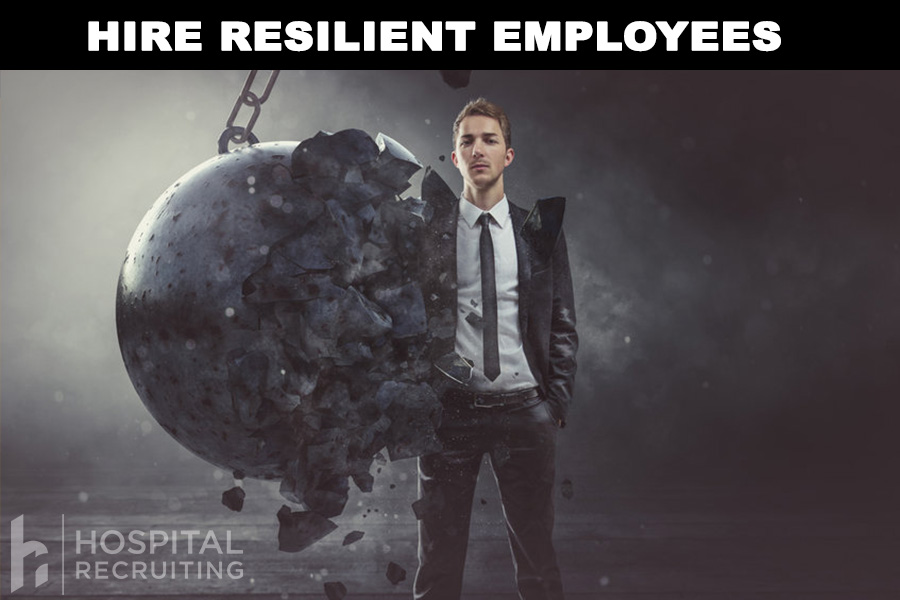Hire Resilient Health Care Workers was originally published on HospitalRecruiting.

One of the many lessons that employers have learned during the COVID epidemic is the importance of employee resilience. We all recognize the importance of having dedicated, compassionate, and skilled healthcare workers. What we need to focus on when hiring is worker resilience.
Why is Resilience Important?
The healthcare field is always stressful. Overwork, health concerns, ever-changing recommendations during the pandemic, and limited resources leave healthcare employees scared and exhausted. Frontline workers faced with dying patients and family members who are often frustrated serve to increase the overall toll on staff. Health care workers are at an elevated risk of developing depression and anxiety due to work stress. Stress contributes to substance abuse and premature death.
Worker resilience enables health care providers with the ability to cope with workplace stress better. Resilience is associated with improved organizational commitment and job satisfaction. Absenteeism may decrease, as stress is a significant factor in employees missing work. Mentally healthy workplaces have lower rates of turnover. Lowered health care costs overall arise. Resiliency leads to increased productivity.
Qualities of Resilient Employees
Resilient workers are crucial to having a successful workplace. Qualities of resilient workers include:
- Flexibility
- Optimism
- Excellent self-care skills
- Positive attitude
- Foresight
- Time management expertise
- Self-knowledge and the ability to manage their emotions
- Good problem-solving abilities.
- Insight to view errors and challenges as opportunities to grow
- Persistence
- Empathy
Some people appear to possess a genetic tendency to be resilient. However, some aspects, such as insight and problem-solving skills, are teachable. Resiliency can be supported and fostered at work; however, that is easier if resilient workers are hired right from the start. Resilient workers make outstanding role models for current staff, for resiliency can be contagious.
Evaluating Job Candidate Resiliency
You likely already evaluate some characteristics of resiliency when conducting interviews and reviewing resumes. Others require employers to take time to ask specific questions.
While we routinely ask potential job candidates about past work experiences, expanding those questions to learn about resiliency is essential.
The following questions and topics will give you insight into how resilient a candidate is likely to be.
- Ask for examples of how they’ve been able to demonstrate flexibility at work or even at home. Candidates that are very skilled at balancing work-life commitments are likely resilient.
- Ask about self-care. Clue into candidates who appear pressured to give all the so-called “right answers,” such as statements like they will always be committed to the organization and put their lives on hold for the organization. At first glance, this may seem desirable; however, this can indicate candidates who do not have good insight into their own needs. They may be more likely to burn out.
- Provide candidates with opportunities to share examples of situations that required problem-solving skills in their previous positions. Listen closely for subtle nuances while the individual describes the situation. While being a great problem solver is an essential skill, it’s also vital to see how the individual managed the stress of the experience.
- Request that candidates provide examples of times that they felt stress in previous positions. Carefully observe their body language. Candidates reveal positive coping strategies or problems solving abilities are desirable.
- While this question is like the previous one, it will likely produce a more intense emotional response. Ask the job applicants to describe a time when they were personally under pressure at work. Evaluate their emotional reaction and problem-solving skills. Notice if they become flustered or express blame. See what lessons they took away as a result.
- Ask about how the candidate encourages prior colleagues to stay upbeat under pressure. You will gain insight into how much of a leader or team player the candidate is.
Be alert for candidates who are talented and willing to work in many areas of the organization. People who like to cross-train tend to be more flexible and adaptable. They can “go with the flow” readily. Candidates who are only comfortable in their niche area are not always the best choice for an organization.
Hiring Resilient Workers Results in Great Rewards
Resilient workers are happier, and happy caregivers are better caregivers. Health care teams are more robust when members are resilient and committed to excellence. Resilient people are problem solvers. Resilience ultimately leads to the possibility of having employees who stay with the organization long-term. It makes sense to build teams with members who have a track record of resiliency.


